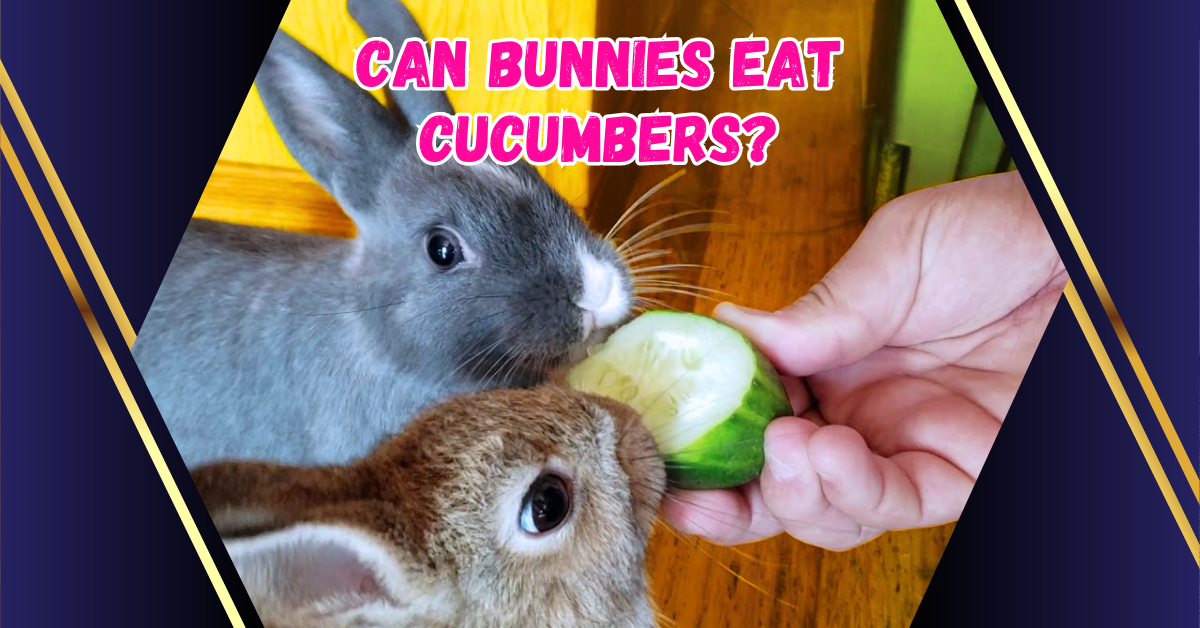When it comes to feeding your bunny, it’s important to know which foods are safe and nutritious for their diet. One common question that pet owners often ask is: can bunnies eat cucumbers? The answer is yes, bunnies can eat cucumbers, but there are a few things to keep in mind. In this comprehensive guide, we’ll explore everything you need to know about feeding cucumbers to bunnies, including how much they can eat, the nutritional benefits, and the risks. Understanding these important facts will help you make the best choices for your bunny’s health and diet.
Can Bunnies Eat Cucumbers? The Answer Explained
Yes, bunnies can eat cucumbers, but like most treats, they should only be given in moderation. Cucumbers are mostly made up of water—about 95%—which makes them a refreshing and hydrating snack for bunnies, especially on hot days. However, because of their high water content and relatively low nutritional value, cucumbers should not make up a large portion of your bunny’s diet.
A rabbit’s diet should primarily consist of hay (around 80% of their diet), with fresh leafy greens, vegetables, and small portions of fruits as treats. Cucumbers fall into the treat category and should be considered a supplement to their regular diet, not a replacement for more nutrient-dense vegetables. Offering a slice of cucumber once or twice a week is safe, but overfeeding can lead to digestive issues due to the high water content.
Nutritional Benefits of Cucumbers for Bunnies
Although cucumbers are low in calories and not particularly nutrient-dense compared to other vegetables, they do offer a few nutritional benefits for bunnies when given as an occasional snack:
- Hydration: Because cucumbers are mostly water, they help keep bunnies hydrated, especially during warmer months. This is a great way to supplement your bunny’s water intake naturally.
- Low-Calorie Treat: Cucumbers are low in calories, which means they won’t contribute significantly to weight gain. This makes them a safe option for bunnies who may be prone to gaining weight.
- Vitamins and Minerals: Cucumbers contain small amounts of vitamin K, vitamin C, and potassium. While these nutrients are present in low amounts, they still contribute to a well-rounded diet when cucumbers are given occasionally.
- Fiber: Although not as fiber-rich as hay or leafy greens, cucumbers contain a small amount of fiber that can support healthy digestion. However, they should never replace high-fiber foods like hay, which is essential for your bunny’s digestive health.
How Much Cucumber Can Bunnies Eat? Guidelines for Safe Feeding
Knowing how much cucumber to feed your bunny is crucial to avoid potential health problems. Since cucumbers are not nutritionally dense and have high water content, it’s important to limit the amount given. Here are some portion control guidelines:
- Start Slowly: If your bunny has never eaten cucumber before, introduce it gradually. Start with a thin slice (about 1-2 inches in length) and monitor your bunny’s reaction for any signs of digestive upset, such as diarrhea or soft stools.
- Limit Frequency: Cucumbers should only be offered as a treat. A slice or two once or twice a week is sufficient. Avoid giving cucumbers daily, as this could disrupt your bunny’s digestive balance.
- Balance with Other Vegetables: Make sure cucumbers are just one of the many vegetables you offer your bunny. A variety of vegetables, such as leafy greens, is essential to provide a wide range of nutrients.
By following these guidelines, you can ensure that your bunny enjoys cucumbers safely without any adverse effects.
Are Cucumbers Healthy for Bunnies? Understanding the Pros and Cons
Cucumbers have both pros and cons when it comes to feeding them to bunnies. While they are safe to eat, it’s important to understand both the benefits and potential risks to make an informed decision.
Pros:
- Hydration: As mentioned earlier, cucumbers can help keep your bunny hydrated, especially in hot weather.
- Low in Calories: Since cucumbers are low in calories, they make a guilt-free snack that won’t contribute to weight gain.
- Digestive Aid: A small amount of fiber in cucumbers can help support digestive health, though it should not replace more fibrous vegetables or hay.
Cons:
- High Water Content: Too much water can cause digestive problems in bunnies, such as diarrhea or an upset stomach. Feeding too much cucumber can lead to these issues.
- Low Nutritional Value: Compared to other vegetables, cucumbers don’t offer a significant amount of vitamins or minerals. Relying too heavily on cucumbers can lead to nutritional deficiencies if they replace healthier vegetables in your bunny’s diet.
In moderation, cucumbers can be a healthy and hydrating snack for bunnies. However, they should always be balanced with other vegetables and never replace their staple food, hay.
Can Bunnies Eat Cucumber Peel and Seeds? What You Need to Know
Many bunny owners wonder if it’s safe to give their pets the peel and seeds of cucumbers. The good news is that both cucumber peel and seeds are safe for bunnies, but there are a few things to keep in mind:
- Cucumber Peel: The peel of a cucumber contains additional fiber, which can be beneficial for your bunny’s digestion. However, if the cucumber is not organic, it may have been sprayed with pesticides or chemicals, which could be harmful to your bunny. Be sure to wash the cucumber thoroughly before feeding it, or opt for organic cucumbers if you plan to leave the skin on.
- Cucumber Seeds: The seeds in cucumbers are soft and small, making them safe for bunnies to eat. Unlike seeds from some fruits, cucumber seeds do not pose a choking hazard or digestive risk.
As long as the cucumber is washed properly, both the peel and seeds are safe for bunnies to consume. If your bunny doesn’t seem to enjoy the peel, you can always remove it and feed only the flesh of the cucumber.
Best Vegetables for Bunnies: Creating a Balanced Diet
While cucumbers are a refreshing snack, they shouldn’t be the only vegetable you offer your bunny. A variety of vegetables is crucial for providing a balanced diet. Here are some of the best vegetables you can add to your bunny’s diet:
- Leafy Greens: Leafy greens should make up a large portion of your bunny’s fresh food intake. Options like romaine lettuce, spinach, and kale are packed with nutrients and are great for daily feeding.
- Carrots: While often associated with bunnies, carrots should be given in moderation due to their high sugar content. Small amounts of carrots make a tasty treat.
- Bell Peppers: Bell peppers are rich in vitamin C and provide a crunchy texture that bunnies love. They’re also low in calories, making them a healthy addition to your bunny’s diet.
- Broccoli: Rich in fiber, broccoli is another vegetable that can support digestion. However, it should be fed in moderation because it can cause gas.
- Herbs: Fresh herbs like parsley, cilantro, and basil add variety to your bunny’s meals and are rich in vitamins and minerals.
By incorporating a variety of these vegetables into your bunny’s diet, you can ensure they receive all the nutrients they need while also enjoying cucumbers as a healthy treat.
How to Safely Introduce Cucumbers to Your Bunny’s Diet
Introducing a new food to your bunny should be done gradually to avoid upsetting their delicate digestive system. Follow these steps to safely introduce cucumbers to your bunny:
- Start Small: Offer your bunny a small slice of cucumber to see how they react. Watch for any signs of digestive issues, such as diarrhea or gas.
- Observe: Monitor your bunny for 24 hours after feeding them cucumber for the first time. If they seem fine and show no signs of discomfort, you can gradually increase the amount.
- Limit Frequency: As mentioned earlier, cucumbers should be given as a treat and not as a daily food. Once or twice a week is enough.
- Mix with Other Vegetables: Pair cucumbers with other vegetables, like leafy greens, to provide a variety of nutrients in one meal.
By following these steps, you can safely introduce cucumbers to your bunny’s diet without any adverse effects.
For more exciting blogs, visit our homepage Magzineco.
Frequently Asked Questions About Bunnies Eating Cucumbers
- Can bunnies eat cucumbers every day?
No, cucumbers should be given as a treat, not as a daily food. Limit cucumber intake to once or twice a week. - Can baby bunnies eat cucumbers?
Baby bunnies have more sensitive digestive systems, so it’s best to wait until they are at least 12 weeks old before introducing cucumbers. Start with a very small slice and observe for any reactions. - Can bunnies eat cucumber seeds?
Yes, cucumber seeds are soft and safe for bunnies to eat. They do not pose any choking or digestive risks. - Is cucumber peel safe for bunnies?
Yes, the peel of a cucumber is safe for bunnies, but be sure to wash it thoroughly to remove any pesticides. Organic cucumbers are a safer option if you want to leave the peel on. - How much cucumber should I give my bunny?
Start with a small slice of cucumber (1-2 inches) and limit their intake to no more than once or twice a week. - Can cucumbers cause digestive problems for bunnies?
Yes, feeding too much cucumber can cause digestive problems like diarrhea due to its high water content. Always feed cucumbers in moderation. - Are cucumbers healthy for bunnies?
In moderation, cucumbers are a healthy and hydrating snack for bunnies. However, they are low in nutrients compared to other vegetables, so they should not replace more nutrient-dense foods. - What are the best vegetables to feed bunnies?
Leafy greens like romaine lettuce, kale, and spinach, as well as vegetables like bell peppers and broccoli, are excellent choices for bunnies. - How do I introduce cucumbers to my bunny’s diet?
Start with a small piece, observe your bunny for any reactions, and gradually increase the amount if they tolerate it well. Always limit cucumber intake to occasional treats. - Can cucumbers help keep my bunny hydrated?
Yes, cucumbers are made up of 95% water, so they can help keep your bunny hydrated, especially in warmer months.
Conclusion
In conclusion, bunnies can safely eat cucumbers as an occasional treat, but moderation is key. Cucumbers provide hydration and a low-calorie snack option, making them a refreshing addition to your bunny’s diet. However, they lack the essential nutrients found in other vegetables like leafy greens and should never replace the staple food of hay. By understanding the proper portion sizes and how to introduce cucumbers safely, you can give your bunny a healthy, enjoyable snack without compromising their digestive health.
Remember, variety is crucial in a bunny’s diet, so balance cucumber treats with nutrient-dense vegetables like kale, romaine lettuce, and herbs to ensure your bunny gets all the necessary vitamins and minerals. With the right approach, cucumbers can be a tasty and safe addition to your bunny’s well-rounded diet.




